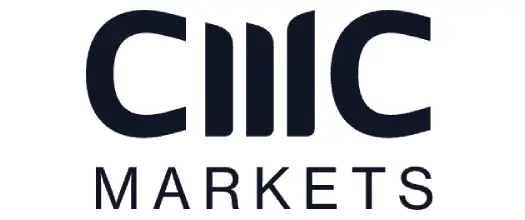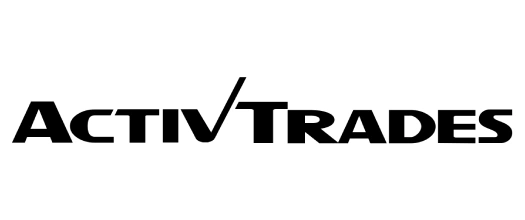Credit cards are a popular funding method among Forex traders from the United Kingdom due to their speed, security, and ease of use. According to the 2024 UK Payment Markets Summary report, credit and debit cards accounted for 61% of all payments made in the UK in 2023. The study projects that by 2033 this percentage will grow to 66%, highlighting bank cards’ dominance over other non-cash methods.
 CMC Markets
CMC Markets Eightcap
Eightcap Pepperstone
Pepperstone FxPro
FxPro IG
IG ActivTrades
ActivTradesBelow, you can find more information about the best trading platforms with credit card funding in the UK:
- CMC Markets enables free deposits and withdrawals with Visa- and Mastercard-branded credit cards, facilitating payments in several base currencies such as GBP, USD, and EUR. The maximum you can deposit with a card is £50,000.
- Eightcap facilitates deposits with Visa and Mastercard with no additional fees in GBP, USD, and EUR. Card withdrawals take between 2 and 5 business days. Deposit limits range from £100 to £50,000 per transaction.
- Pepperstone offers a variety of funding methods, including Visa, Mastercard, PayPal, Skrill, and Neteller. Card deposits are typically processed instantly. There is no global deposit size requirement, but the minimum funding amount stands at £10 for spread betting, CFD (Standard), and CFD (Razor) accounts.
- FxPro accepts Visa and Mastercard for transactions and charges no additional processing fees. Card deposits are generally processed within 10 minutes, but the time frame may extend to 24 hours under certain circumstances. The deposit minimum for bank cards is £100, while the maximum amount clients can deposit stands at £40,000.
- IG enables account funding with Visa, Mastercard, Apple Pay, and bank transfers, requiring UK customers to transfer at least £1 by credit card. The bank card deposit limit is £30,000 (credit) and £99,999 (debit) per day. For international clients, the deposit minimum is 50 in their base currency.
- ActivTrades enables balance funding with Mastercard- and Visa-branded credit and debit cards. Deposits with cards issued in the UK and the EEA incur no additional fees and take up to 30 minutes to process. The broker has waived its minimum account requirements.
In this article, we focus on UK-friendly brokerages that support credit card transactions, covering topics such as the steps in the deposit process, the identity verification requirements, and the potential costs of using credit cards. We also highlight the key criteria for choosing a broker and the pros and cons of using credit cards for Forex trading. For those eager to embark on their trading journey, here is our selection of reliable brokers accepting credit card deposits from UK traders.
Are Credit Cards Popular among UK Traders?
Credit cards have gained significant traction in the UK over the past decade, although they have historically lagged behind other payment methods such as direct debit and cash. Recent findings outlined in the UK Payment Markets Summary 2024 report indicate that in 2023, 65% of adults residing in the UK were credit card users.
Credit card payments totalled 4.6 billion transactions, reflecting a 0.5-billion increase on the previous year. This rise was driven by the rapid growth of e-commerce in recent years and the convenience that credit cards offer. Additionally, estimates point to volumes hitting 5.7 billion payments by 2033.
While Visa and Mastercard dominate the UK credit card processing network, numerous financial institutions and other companies issue credit cards that run on these networks. Some of the prominent credit card issuers in the UK include Barclaycard, American Express, HSBC, NatWest, RBS, Tesco Bank, Santander, Halifax, Virgin Money, M&S Bank, and Capital One.
UK providers offer a variety of credit card products with different features such as rewards, balance transfers, low interest rates, and cashback, catering to a wide range of consumer needs. Each of the above-mentioned issuers competes to attract customers through its specific offerings and brand appeal.
Funding Your Forex Account with Credit Cards
Credit cards are among the fastest and most convenient payment methods UK traders can use to fund their live Forex accounts. They facilitate instant deposits, allowing you to seize favourable market opportunities straightaway once you have created a trading account and verified your identity.
This payment method is particularly appealing for its simplicity, robust security, and widespread acceptance among Forex brokers. We outline the steps in the credit card deposit process below:
- Choose a Reliable Broker: The first step is to select a Forex broker that accepts credit card deposits. You will have plenty of options to choose from, as nearly all trading sites accept the method. Preferably, your chosen brokerage should be regulated by the FCA and comply with local regulations to guarantee a secure trading environment.
- Create a Live Trading Account: Once you have chosen a broker, you must open a live account to start trading with real money. This usually involves providing personal information, such as your full name, address, and contact details, and agreeing to the broker’s terms and conditions.
- Complete the KYC Verification: You must verify your identity before you can deposit funds. This is a mandatory step at all regulated brokers and involves submitting identification documents (a passport or government-issued identity card) and proof of address, such as a utility bill or a credit card statement.
- Navigate to the Deposit Section: After verifying your identity, log in to your trading account and visit the deposit section. Select credit card as the preferred payment method.
- Enter Card Details: Provide the required credit card information, including the card number, expiry date, and CVV code found on the back. Users must also specify the amount to deposit. Minimum deposit requirements often range from £0 to £100, depending on the broker.
- Confirm the Transaction: Review the details of your deposit and proceed with the transaction. Most brokers process credit card deposits instantly, allowing you to start trading almost immediately.
- Start Trading: Once the funds are credited to your live balance, you can start placing orders in Forex pairs, commodities, indices, and other financial instruments. FCA-compliant brokers enable UK retail traders to increase their market exposure with leverage of up to 1:30.
Take Note! FCA-regulated brokers require traders to use only credit cards issued in their own name to comply with anti-money laundering (AML) and know-your-customer (KYC) regulations. This measure is essential for maintaining the integrity of the financial system and protecting both the broker and other market participants from financial crime.
KYC Verification at Credit Card Forex Brokers
FCA-regulated Forex brokers are legally mandated to conduct thorough Know Your Customer (KYC) and Anti-Money Laundering (AML) checks on all their clients to uphold the integrity of the financial markets and prevent fraud. Upon onboarding, traders must undergo a verification process that involves providing identification documents such as passports or driving licences and proof of address, such as utility bills or bank statements. These documents are meticulously reviewed to confirm the trader’s identity.
Furthermore, brokers are obligated to understand the source of a client’s funds and their trading objectives to assess potential risks. Ongoing monitoring of trading activity is also crucial, allowing brokers to detect and report any suspicious transactions that may indicate money laundering or other illicit activities.
By adhering to these stringent KYC and AML procedures set forth by the FCA, brokers contribute to a safer trading environment and help combat financial crime within the UK’s regulatory framework. This rigorous process ensures that funds used for trading can be directly linked to the account holder, preventing illicit activities and promoting transparency. Generally, the process involves the following elements:
- Submission of Identification Documents: Traders must upload a copy of a government-issued ID, such as a passport or national ID card. The picture and information in the photos must be legible, or else the broker will not accept the documents.
- Proof of Address: To confirm their current residential address, traders must also submit a recent utility bill, bank statement, or a similar document. It should be recent, i.e., issued within the last three months.
- Additional Documentation: In some cases, brokers may request additional documents, such as a copy of the credit card used for the deposit (with certain details obscured for security).
Take Note! While FCA regulations necessitate strict KYC procedures, they do not require the submission of photos of the front and back of the card being used. It is up to each broker to determine what verification methods they deem necessary to comply with those regulations. Therefore, some FCA-regulated brokers might ask for card images, so make sure you have your credit card handy.
For UK traders, completing the KYC verification process at FCA-regulated Forex brokers typically involves several standard methods, primarily centred around digital document submission due to the online nature of Forex trading:
- Online Document Upload: This is the most common method. Brokers provide a secure portal on their website or within their trading platform where traders can upload digital copies (scans or clear photographs) of the required identification and address verification documents.
- Mobile Application Submission: Many brokers with mobile trading apps allow traders to directly upload photos of their documents using their smartphone or tablet camera. This offers convenience and speed.
- Email Submission (Less Common but Possible): While less secure than dedicated portals, some brokers might allow documents to be submitted via encrypted email. However, this is becoming increasingly rare due to security concerns.
- Third-Party Verification Services: Some brokers integrate with third-party KYC verification providers. In this case, the trader might be redirected to a secure platform hosted by a third party to upload their documents and undergo the verification process. These services often use automated systems to expedite the checks.
- Video Verification (Occasionally Required): For enhanced due diligence or when there are issues with submitted documents, some brokers might request a live video call to verify the trader’s identity. This involves showing their ID to a representative via webcam.
Costs of Using Credit Cards at UK Forex Brokers
When using a credit card to fund your Forex trading account, it is important to consider the potential extra costs. While most brokers do not charge fees for credit card deposits, some may impose a small percentage-based fee, typically ranging from 1% to 3% of the deposit amount.
Withdrawals to credit cards are typically supported and may incur higher fees compared with other withdrawal methods such as e-wallets. Some brokers also impose minimum deposit and withdrawal requirements for credit card transactions, so it is essential to review the broker’s payment policies before making a deposit. As we mentioned, minimum deposit requirements normally range from £0 to £100, while withdrawals usually start from £50.
It is also worth noting that using a credit card for Forex trading can have implications for your credit score, especially if you carry a balance or exceed your credit limit. Therefore, it is advisable to use credit cards responsibly and only deposit amounts that you can afford to lose in the event of adverse market movements.
Factors to Consider When Choosing Credit Card Brokers in the UK
Selecting the right Forex broker is an important decision for traders looking to deposit securely with their credit cards. With numerous brokers catering to the UK market, it is essential to consider several key factors that ensure a secure, efficient, and cost-effective trading experience.
From regulatory compliance to customer support quality, these criteria can help you determine whether a broker aligns with your trading goals and provides sufficient quality in this highly competitive market.
- Regulatory Compliance: Ensure your chosen broker is licensed by the FCA and complies with MiFID II regulations. This guarantees that the company upholds high standards and offers a secure trading environment.
- Industry Reputation: Choose a broker that has been in business for at least several years and has positive reviews from traders and other online reviewers.
- Consumer Feedback: Read reviews and testimonials from other UK traders to gauge the broker’s reliability, the quality of its customer service, and its overall performance. You can also check the broker’s consumer rating on Trustpilot. Alternatively, traders can search for a specific broker on Google. If the company has a Google Business Profile, its customer reviews should appear in the search results.
- Processing Time Frames: Opt for brokers that offer instant credit card deposits, allowing you to start trading without delay. Withdrawals to credit cards should not take more than 3 to 5 business days.
- Transaction Fees: Compare the fees charged by different brokers for credit card deposits and withdrawals. Many brokers may offer fee-free deposits, although some may charge a small percentage.
- Spreads and Trading Costs: Consider the broker’s spreads, commissions, and other trading costs, as these can significantly impact your profitability. Look for brokers that offer tight spreads, discounted commissions, and no inactivity fees.
- Range of Tradable Assets: Choose a broker that offers a wide range of tradable assets, including dozens of Forex pairs, commodities, indices, and shares. This allows you to diversify your trading portfolio.
- Customer Support Quality: Ensure the broker offers prompt and professional assistance. This is especially important if you encounter any issues with your account or transactions.
- Simplicity of the Account Opening Process: Look for brokers that offer a straightforward and hassle-free account opening process, including easy KYC verification methods. Registering an account should not take more than 10 minutes.
Advantages and Disadvantages of Trading with Credit Card Brokers
Traders should carefully weigh both the benefits and shortcomings of using this payment method. While credit cards offer great convenience, efficiency, and speed, they also come with certain limitations and potential risks. Understanding the pros and cons is essential for making informed decisions that align with your financial goals and trading strategy, ensuring a seamless and secure Forex trading experience.
Here are the main benefits of depositing and withdrawing from your Forex account with credit cards.
- Speed and Convenience: Credit card deposits are processed instantly, allowing you to start trading immediately. This is particularly useful for scalpers and day traders who want to take advantage of market opportunities without delay.
- Security: Credit cards offer robust security features, including fraud protection and chargeback options. This provides peace of mind when making online transactions.
- Wide Acceptance: Most Forex brokers operating in the UK accept credit cards, making it easy to fund your account regardless of the trading site you choose.
- Rewards and Benefits: Some credit cards offer rewards, such as cashback or travel points, which can add value to your deposits. Consider the following shortcomings before you reach for your credit card when depositing at a broker.
- Potential Fees: Credit card deposits may incur fees, either from the broker or the card issuer. These expenses can add up, especially if you deposit frequently.
- Credit Limit: Your credit card’s limit may restrict the amount you can deposit, limiting your trading potential.
- Impact on Credit Score: Using a credit card for Forex trading can affect your credit score, particularly if you carry a balance or miss payments.
FAQs about Credit Card Forex Brokers
Is depositing with a credit card suitable for day traders and Forex scalpers?
Using a credit card for Forex deposits offers scalpers and day traders speed and convenience, which are crucial for seizing short-term opportunities. However, the potential downsides should also be considered. Frequent trading necessitates careful cost management to maintain profitability due to potential fees. Readily available credit can also encourage overtrading, a serious risk with less-disciplined traders.
Is depositing with a credit card safe at Forex brokers?
Depositing with a credit card is generally safe, but it still requires caution. FCA- and EU-regulated brokers adopt robust security measures to protect your sensitive card details. Traders should verify the broker’s regulatory status and security protocols (like SSL encryption) before depositing. Using virtual cards or prepaid cards can add an extra layer of security. Monitoring card statements for unauthorised transactions is essential, regardless of the broker’s security measures.
What is the maximum amount Forex traders can typically deposit with a credit card?
This varies depending on the broker and the card issuer’s limits. Most brokers set deposit limits ranging from £10,000 to £50,000 per transaction, though some may allow higher amounts for verified accounts. Additionally, the cardholder’s credit limit and the broker’s policies may further restrict the deposit amount. Traders should check with both their broker and credit card issuer to confirm the specific limits applicable to their account.
Are credit card deposits at online trading sites considered cash advances?
Credit card deposits are not usually considered cash advances by most brokers. Instead, they are typically processed as standard purchases. However, this depends on the broker’s payment processor and the card issuer’s policies. Some banks may classify such transactions as cash advances, which can incur higher fees and interest rates.
Can I deposit with the credit card of my spouse or another family member?
No, you cannot deposit with the credit card of a spouse, relative, or friend. Regulated brokers require that the credit card used for deposits be registered in the trader’s name as part of their KYC and anti-money laundering policies. Using someone else’s card may lead to rejected transactions or account suspension.